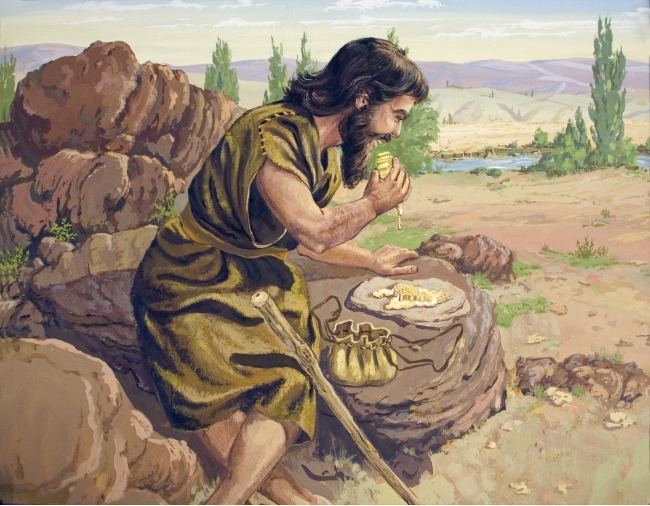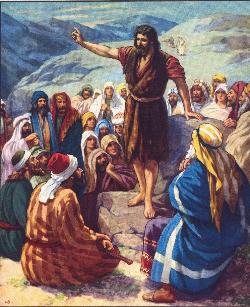
In The Desert
“John found in the wilderness his school and his sanctuary. Like Moses amid the mountains of Midian, he was shut in by God's presence, and surrounded by the evidences of His power. It was not his lot to dwell, as did Israel's great leader, amid the solemn majesty of the mountain solitudes; but before him were the heights of Moab, beyond Jordan, speaking of Him who had set fast the mountains, and girded them with strength. The gloomy and terrible aspect of nature in his wilderness home vividly pictured the condition of Israel. The fruitful vineyard of the Lord had become a desolate waste. But above the desert the heavens bent bright and beautiful. The clouds that gathered, dark with tempest, were arched by the rainbow of promise. So above Israel's degradation shone the promised glory of the Messiah's reign. The clouds of wrath were spanned by the rainbow of His covenant-mercy.
Alone in the silent night he read God's promise to Abraham of a seed numberless as the stars. The light of dawn, gilding the mountains of Moab, told of Him who should be as "the light of the morning, when the sun riseth, even a morning without clouds."
2 Samuel 23:4. And in the brightness of noontide he saw the splendor of His manifestation, when "the glory of the Lord shall be revealed, and all flesh shall see it together."
Isaiah 40:5.
With awed yet exultant spirit he searched in the prophetic scrolls the revelations of the Messiah's coming,--the promised seed that should bruise the serpent's head; Shiloh, "the peace giver," who was to appear before a king should cease to reign on David's throne. Now the time had come. A Roman ruler sat in the palace upon Mount Zion. By the sure word of the Lord, already the Christ was born.
Isaiah's rapt portrayals of the Messiah's glory were his study by day and by night,--the Branch from the root of Jesse; a King to reign in righteousness, judging "with equity for the meek of the earth;" "a covert from the tempest; . . . the shadow of a great rock in a weary land;" Israel no longer to be termed "Forsaken," nor her land "Desolate," but to be called of the Lord, "My Delight," and her land "Beulah." Isaiah 11:4; 32:2; 62:4, margin. The heart of the lonely exile was filled with the glorious vision.
He looked upon the King in His beauty, and self was forgotten. He beheld the majesty of holiness, and felt himself to be inefficient and unworthy. He was ready to go forth as Heaven's messenger, unawed by the human, because he had looked upon the Divine. He could stand erect and fearless in the presence of earthly monarchs, because he had bowed low before the King of kings.
John did not fully understand the nature of the Messiah's kingdom. He looked for Israel to be delivered from her national foes; but the coming of a King in righteousness, and the establishment of Israel as a holy nation, was the great object of his hope. Thus he believed would be accomplished the prophecy given at his birth,--
"To remember His holy covenant; . . .
That we being delivered out of the hand of our enemies
Might serve Him without fear,
In holiness and righteousness before Him, all the days of our
life."
He saw his people deceived, self-satisfied, and asleep in their sins. He longed to rouse them to a holier life. The message that God had given him to bear was designed to startle them from their lethargy, and cause them to tremble because of their great wickedness. Before the seed of the gospel could find lodgment, the soil of the heart must be broken up. Before they would seek healing from Jesus, they must be awakened to their danger from the wounds of sin.
God does not send messengers to flatter the sinner. He delivers no message of peace to lull the unsanctified into fatal security. He lays heavy burdens upon the conscience of the wrongdoer, and pierces the soul with arrows of conviction. The ministering angels present to him the fearful judgments of God to deepen the sense of need, and prompt the cry, "What must I do to be saved?" Then the hand that has humbled in the dust, lifts up the penitent. The voice that has rebuked sin, and put to shame pride and ambition, inquires with tenderest sympathy, "What wilt thou that I shall do unto thee?" When the ministry of John began, the nation was in a state of excitement and discontent verging on revolution. At the removal of Archelaus, Judea had been brought directly under the control of Rome. The tyranny and extortion of the Roman governors, and their determined efforts to introduce the heathen symbols and customs, kindled revolt, which had been quenched in the blood of thousands of the bravest of Israel. All this intensified the national hatred against Rome, and increased the longing to be freed from her power.
Amid discord and strife, a voice was heard from the wilderness, a voice startling and stern, yet full of hope: "Repent ye; for the kingdom of heaven is at hand." With a new, strange power it moved the people. Prophets had foretold the coming of Christ as an event far in the future; but here was an announcement that it was at hand. John's singular appearance carried the minds of his hearers back to the ancient seers. In his manner and dress he resembled the prophet Elijah. With the spirit and power of Elijah he denounced the national corruption, and rebuked the prevailing sins. His words were plain, pointed, and convincing. Many believed him to be one of the prophets risen from the dead. The whole nation was stirred. Multitudes flocked to the wilderness.
John proclaimed the coming of the Messiah, and called the people to repentance. As a symbol of cleansing from sin, he baptized them in the waters of the Jordan. Thus by a significant object lesson he declared that those who claimed to be the chosen people of God were defiled by sin, and that without purification of heart and life they could have no part in the Messiah's kingdom.
Princes and rabbis, soldiers, publicans, and peasants came to hear the prophet. For a time the solemn warning from God alarmed them. Many were brought to repentance, and received baptism. Persons of all ranks submitted to the requirement of the Baptist, in order to participate in the kingdom he announced.
Many of the scribes and Pharisees came confessing their sins, and asking for baptism. They had exalted themselves as better than other men, and had led the people to entertain a high opinion of their piety; now the guilty secrets of their lives were unveiled. But John was impressed by the Holy Spirit that many of these men had no real conviction of sin. They were timeservers. As friends of the prophet, they hoped to find favor with the coming Prince. And by receiving baptism at the hands of this popular young teacher, they thought to strengthen their influence with the people.
John met them with the scathing inquiry, "O generation of vipers, who hath warned you to flee from the wrath to come? Bring forth therefore fruits meet for repentance; and think not to say within yourselves, We have Abraham to our father: for I say unto you, that God is able of these stones to raise up children unto Abraham."
The Jews had misinterpreted God's promise of eternal favor to Israel: "Thus saith the Lord, which giveth the sun for a light by day, and the ordinances of the moon and of the stars for a light by night, which divideth the sea when the waves thereof roar; The Lord of hosts is His name: If those ordinances depart from before Me, saith the Lord, then the seed of Israel also shall cease from being a nation before Me forever. Thus saith the Lord; If heaven above can be measured, and the foundations of the earth searched out beneath, I will also cast off all the seed of Israel for all that they have done, saith the Lord." Jeremiah 31:35-37. The Jews regarded their natural descent from Abraham as giving them a claim to this promise. But they overlooked the conditions which God had specified. Before giving the promise, He had said, "I will put My law in their inward parts, and write it in their hearts; and will be their God, and they shall be My people. . . . For I will forgive their iniquity, and I will remember their sin no more."
Jeremiah 31:33, 34.
To a people in whose hearts His law is written, the favor of God is assured. They are one with Him. But the Jews had separated themselves from God. Because of their sins they were suffering under His judgments. This was the cause of their bondage to a heathen nation. Their minds were darkened by transgression, and because in times past the Lord had shown them so great favor, they excused their sins. They flattered themselves that they were better than other men, and entitled to His blessings.
These things "are written for our admonition, upon whom the ends of the world are come." 1 Corinthians 10:11. How often we misinterpret God's blessings, and flatter ourselves that we are favored on account of some goodness in us! God cannot do for us that which He longs to do. His gifts are used to increase our self-satisfaction, and to harden our hearts in unbelief and sin.
John declared to the teachers of Israel that their pride, selfishness, and cruelty showed them to be a generation of vipers, a deadly curse to the people, rather than the children of just and obedient Abraham. In view of the light they had received from God, they were even worse than the heathen, to whom they felt so much superior. They had forgotten the rock whence they were hewn, and the hole of the pit from which they had been digged. God was not dependent upon them for the fulfilling of His purpose. As He had called Abraham out from a heathen people, so He could call others to His service. Their hearts might now appear as lifeless as the stones of the desert, but His Spirit could quicken them to do His will, and receive the fulfillment of His promise.
"And now also," said the prophet, "the ax is laid unto the root of the trees: therefore every tree which bringeth not forth good fruit is hewn down, and cast into the fire." Not by its name, but by its fruit, is the value of a tree determined. If the fruit is worthless, the name cannot save the tree from destruction. John declared to the Jews that their standing before God was to be decided by their character and life. Profession was worthless. If their life and character were not in harmony with God's law, they were not His people.
DA 102-107
